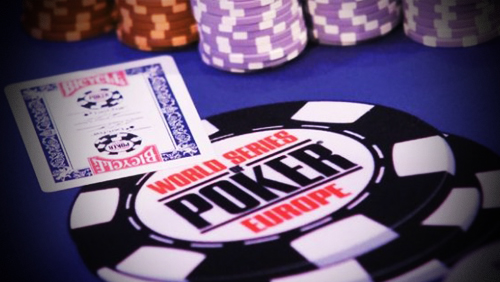 After taking a little time to breathe after the Summer Series ended in Las Vegas back in July, the World Series of Poker gets back to action today. For the next two weeks Paris will be the center of the poker universe as the French capital hosts WSOP Europe for the first time. (London, England, and Cannes, France, have played host to WSOPE during its previous six years.) To celebrate, here’s here’s a rundown of five trends that have developed over the years while handing out bracelets over the pond.
After taking a little time to breathe after the Summer Series ended in Las Vegas back in July, the World Series of Poker gets back to action today. For the next two weeks Paris will be the center of the poker universe as the French capital hosts WSOP Europe for the first time. (London, England, and Cannes, France, have played host to WSOPE during its previous six years.) To celebrate, here’s here’s a rundown of five trends that have developed over the years while handing out bracelets over the pond.
1. Women have done well
This year’s WSOP Europe kicks off with a ladies’ event – fitting since women have improved on their Vegas track record over in Europe. In all, four of the 30 all-time WSOPE events have featured a woman at the final table, three of which ended in at least a runner-up finish.
Jennifer Harman nearly won the very first WSOPE event ever held, a £2,500 HORSE tournament, but fell short and finished second to Germany’s Thomas Bihl. One week later Norway’s Annette Obrestad – still just 18 years old at the time – won the inaugural WSOP Europe Main Event and with it £1,000,000 ($2,013,734 at the time). The next year saw Linda Lee take seventh place in a £1,500 No Limit Hold’em tournament. Then, in 2012, Ana Marquez finished second in the €1,500 Pot Limit Omaha event. They might have only managed that one bracelet in six years, but that’s still 3.3 percent of all the bracelets awarded in Europe – and Obrestad’s 2007 win remains by far the largest WSOP prize ever won by a woman.
2. Intercontinental bracelet winners
It’s become fairly common to see players win one bracelet in Vegas during the summer and then follow up with a win in Europe. Jesper Hougaard of Denmark was the first to pull of the feat, winning the 2008 £1,500 No Limit Hold’em after winning a $1,500 event in the same discipline in Vegas. The United Kingdom’s J.P. Kelly did it in 2009, winning the £1,000 No Limit Hold’em tourney in London after taking down that summer’s $1,500 Pot Limit Hold’em tournament in Vegas. Both Antonio Esfandiari and Phil Hellmuth did it last year – Esfandiari with a victory in the €1,000 No Limit Hold’em after winning the Big One For One Drop, and Hellmuth win a win in the WSOPE Main Event after winning the $2,500 Razz in Vegas.
3. Past champions welcome
Even if we exclude the four players from above who reprised their summer wins, past WSOP bracelet winners have enjoyed significant success at WSOP Europe. Barry Shulman and John Juanda both won the WSOPE Main Event, winning their second and fourth bracelets, respectively. Jeffrey Lisandro’s win in the £5,000 Pot Limit Omaha event back in 2010 was his fifth career gold bracelet. Steve Billirakis, once the youngest bracelet winner in WSOP history, earned his second piece of hardware with a win in the £5,000 Pot Limia Omaha event in 2011. And Michael Mizrachi earned his second career bracelet in the 2011 £10,000 Mixed No Limit Hold’em tournament.
Despite all this repetition among winners, nobody has yet won two WSOPE bracelets. Nor has a player whose first career bracelet came in Europe then gone on to win one in Vegas. In fact, only Mizrachi has gone on to win another bracelet in Vegas after winning one in Europe. So, there are still some superlatives left for players to shoot for.
4. Home-felt advantage
Historically the United States has had an enormous advantage in WSOP events. Even discounting the first decade when players from Europe were exceedingly rare, Americans have won by far the majority of WSOP events. Twenty-two nations in Europe have combined for 124 bracelets all-time, compared to the 879 taken down by American players. But when we consider only the bracelets awarded at WSOP Europe, things even out a bit. In all, 16 of the WSOPE 30 bracelets awarded since 2007 – or 53.3 percent – have gone to Europeans.
5. American clutch
Europeans might hold the edge in bracelets won at WSOPE, but American players have come through in big situations. Twenty-six of the 30 WSOPE final tables played to date have featured at least one American. And four of the six Main Event winners – Elio Fox, Phil Hellmuth, John Juanda, and Barry Shulman – were from the United States, accounting for four of the five largest winner’s purses ever awarded at WSOPE.